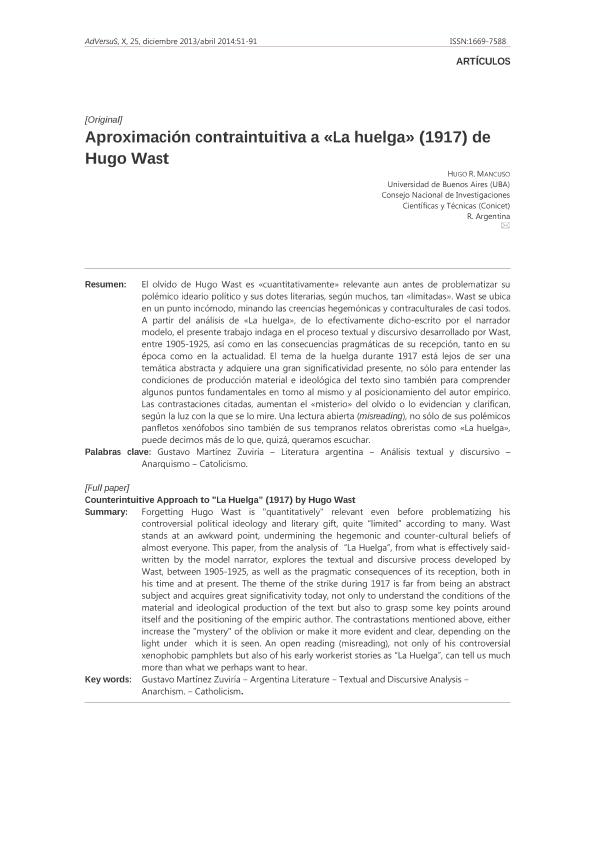Mostrar el registro sencillo del ítem
dc.contributor.author
Mancuso, Hugo Rafael

dc.date.available
2019-12-17T14:19:13Z
dc.date.issued
2014-04
dc.identifier.citation
Mancuso, Hugo Rafael; Aproximación contraintuitiva a «La huelga» (1917) de Hugo Wast; Istituto Italo-argentino di Ricerca Sociale; Adversus; X; 25; 4-2014; 51-91
dc.identifier.issn
1669 7588
dc.identifier.uri
http://hdl.handle.net/11336/92357
dc.description.abstract
El olvido de Hugo Wast es «cuantitativamente» relevante aun antes de problematizar su polémico ideario político y sus dotes literarias, según muchos, tan «limitadas». Wast se ubica en un punto incómodo, minando las creencias hegemónicas y contraculturales de casi todos. A partir del análisis de «La huelga», de lo efectivamente dicho-escrito por el narrador modelo, el presente trabajo indaga en el proceso textual y discursivo desarrollado por Wast, entre 1905-1925, así como en las consecuencias pragmáticas de su recepción, tanto en su época como en la actualidad. El tema de la huelga durante 1917 está lejos de ser una temática abstracta y adquiere una gran significatividad presente, no sólo para entender las condiciones de producción material e ideológica del texto sino también para comprender algunos puntos fundamentales en torno al mismo y al posicionamiento del autor empírico. Las contrastaciones citadas, aumentan el «misterio» del olvido o lo evidencian y clarifican, según la luz con la que se lo mire. Una lectura abierta (misreading), no sólo de sus polémicos panfletos xenófobos sino también de sus tempranos relatos obreristas como «La huelga», puede decirnos más de lo que, quizá, queramos escuchar.
dc.description.abstract
Forgetting Hugo Wast is "quantitatively" relevant even before problematizing his controversial political ideology and literary gift, quite “limited” according to many. Wast stands at an awkward point, undermining the hegemonic and counter-cultural beliefs of almost everyone. This paper, from the analysis of “La Huelga”, from what is effectively saidwritten by the model narrator, explores the textual and discursive process developed by Wast, between 1905-1925, as well as the pragmatic consequences of its reception, both in his time and at present. The theme of the strike during 1917 is far from being an abstract subject and acquires great significativity today, not only to understand the conditions of the material and ideological production of the text but also to grasp some key points around itself and the positioning of the empiric author. The contrastations mentioned above, either increase the "mystery" of the oblivion or make it more evident and clear, depending on the light under which it is seen. An open reading (misreading), not only of his controversial xenophobic pamphlets but also of his early workerist stories as “La Huelga”, can tell us much more than what we perhaps want to hear.
dc.format
application/pdf
dc.language.iso
spa
dc.publisher
Istituto Italo-argentino di Ricerca Sociale
dc.rights
info:eu-repo/semantics/openAccess
dc.rights.uri
https://creativecommons.org/licenses/by-nc-sa/2.5/ar/
dc.subject
Gustavo Martínez Zuviría
dc.subject
Análisis textual y discursivo
dc.subject
Anarquismo
dc.subject
Catolicismo
dc.subject.classification
Literaturas Específicas

dc.subject.classification
Lengua y Literatura

dc.subject.classification
HUMANIDADES

dc.title
Aproximación contraintuitiva a «La huelga» (1917) de Hugo Wast
dc.title
Counterintuitive Approach to "La Huelga” (1917) by Hugo Wast
dc.type
info:eu-repo/semantics/article
dc.type
info:ar-repo/semantics/artículo
dc.type
info:eu-repo/semantics/publishedVersion
dc.date.updated
2019-10-28T14:34:59Z
dc.journal.volume
X
dc.journal.number
25
dc.journal.pagination
51-91
dc.journal.pais
Argentina

dc.journal.ciudad
Ciudad Autónoma de Buenos Aires
dc.description.fil
Fil: Mancuso, Hugo Rafael. Consejo Nacional de Investigaciones Científicas y Técnicas; Argentina. Universidad de Buenos Aires; Argentina
dc.journal.title
Adversus
dc.relation.alternativeid
info:eu-repo/semantics/altIdentifier/url/http://www.adversus.org/indice/nro-25/articulos/X-25-03.pdf
Archivos asociados
